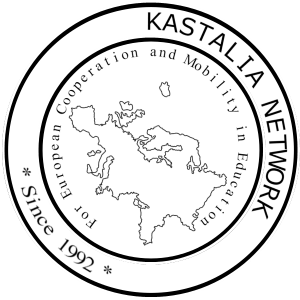
KASTALIA PRINCIPLES
2016 June 15
History and background
Since 1992 the KASTALIA network has tried to improve the flow of information to those students of education in Europe who want to look beyond their own university. KASTALIA is a network of 18 institutions of teacher education, with a wide spectrum of subject areas. It covers all levels of education from pre-primary, primary, secondary and tertiary up to the research level. The network arranges both student and staff mobility, perceives and develops professional teacher-education-student profiles, develops ways of co-operating in different educational areas and shares academic activities.
The name KASTALIA comes from Greece. KASTALIA is the sacred spring at Delphi, the sanctuary of Apollo and the seat of his oracle, Pythia. The spring is said to have a divine power of purification and foretells the future. Pythia used to drink from the clear waters of the spring. Education is like water, it is a life force, it quenches the thirst for knowledge, and it moistens dry soil into fertile land.
Future teachers should see their educational work as a spring which diffuses new ideas like moisture. In the light of internationalization and unified Europe it is crucial for future teachers to be familiar with and respect other cultures, other educational systems, other methods of teaching. In the near future, teachers will not only meet people from other nations and cultures when they travel abroad, but more and more at home, in their own classrooms.
Mission statement
In a world of growing complexity and uncertainty, networking is today even more necessary than when we started 20 years ago. However, the values we share today are still the same and we cherish the heritage of Kastalia founders. Such values are rooted in the strong belief of the importance of education for the development of societies and the role of teachers’ education answering to the challenges that are faced everyday both locally and globally, particularly in which respects the defense of peace, human rights, freedom and solidarity. Sharing is our key word, because only through this sharing process, those who are involved (teachers, students, staff) can be more aware and respectful of others differences and particularities, see beyond themselves and their own reality and enlarge their world vision. A world vision that is not confined only to European cultures or borders, but it is open to non European views. Therefore, the mission of Kastalia network is to contribute for a broader educational corpus of knowledge and expertise, to enrich the reflection and to promote change in traditional ways of thinking.
Objectives
Joint projects
Innovative approaches to mobility. E.g. Teaching practice, virtual exchange, short mobility, study trips, summer school, joint courses and so on.
Research
Network
The annual meeting
Board